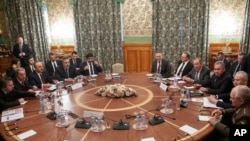Libya's rival leaders were in Moscow Monday for talks as part of a joint Russian and Turkish mediation to bring an end to the country's long-running civil war.
Fayez Sarraj, the head of Libya's U.N.-recognized government in Tripoli, and his rival Khalifa Haftar came for talks with top diplomats and military officials from Russia and Turkey. The talks were held behind closed doors, and it wasn't immediately clear whether Sarraj and Haftar will meet directly.
The negotiations follow a truce proposed by Russia and Turkey that began Sunday — the first break in fighting in months. There were immediate reports of violations by both sides, however, raising concerns it might not hold.
The civil war had been on the brink of a major escalation. Various foreign players back Libya's rival governments, and they have recently been stepping up their involvement in the oil-rich nation's conflict.
Turkey's foreign and defense ministers held talks with their Russian counterparts in Moscow on Monday as part of a shared effort to mediate a peace deal. The two countries back the opposing Libyan governments.
Russian Foreign Ministry spokeswoman Maria Zakharova said the two Libyan delegations will join them later in the day.
Libya plunged into turmoil after the 2011 civil war that ousted and killed long-time dictator Moammar Gadhafi.
The eastern government is supported by France, Russia and key Arab countries, including Egypt, the United Arab Emirates and Saudi Arabia.
Turkey, Italy and Qatar support the Tripoli government, which has faced an offensive by Haftar's forces, which closed in on the capital.
Russia has maintained contacts with both conflicting parties in Libya, but the government in Tripoli has recently charged that Russian military contractors were fighting alongside Haftar.
Asked Saturday about Russian private security companies in Libya, Russian President Vladimir Putin responded that “if there are Russian citizens there, they do not represent the interests of the Russian state and do not receive any money from the Russian state.”
Putin noted that mercenaries were sent to Libya from Syria's rebel-held province of Idlib alongside Turkey's border, voicing hope that a lasting truce will help end the deployment of foreign fighters to Libya.
Turkish President Recep Tayyip Erdogan said earlier this month that his country was sending military personnel to Libya to support Sarraj's government. Sarraj visited Istanbul for talks with Erdogan Sunday before heading to Moscow.
The negotiations follow the deals struck by Russia and Turkey to coordinate their action in Syria, where Moscow has shored up President Bashar Assad's government and Ankara has backed his foes.
Putin discussed the situation in Libya with German Chancellor Angela Merkel, who visited Moscow on Saturday. The Russian leader welcomed Germany's plan to hold a Libya peace summit in Berlin early this year.
On Sunday, Putin also discussed Libya in phone calls with French President Emmanuel Macron and Italian Prime Minister Giuseppe Conte. The Kremlin said they emphasized the need to respect the truce that took effect Sunday and spoke in support of the planned summit in Berlin.
Merkel's spokesman, Steffen Seibert, said that preparations for a Libya conference in Berlin are “in the home stretch” after weeks of consultations. He said the plan is for it to be held in January, but things aren't yet so far advanced that a date can be officially announced.
Turkey's Erdogan, speaking at a joint news conference Monday with the Italian prime minister, said he was hopeful that the Moscow meeting would form the basis for the Berlin meeting.
“My wish is for a cease-fire on a solid foundation to be the basis of peace for the future of our Libyan siblings and Libyan friends,” he said.
Seibert indicated that Sunday is one possibility for the conference. He was responding to a question about a report by CNN Turk that Erdogan would visit Germany on Sunday to attend the meeting. Erdogan's office later confirmed that he will visit on Sunday, but didn't specify why.
“Such a Berlin conference could only be the start of a longer process, and it must of course ultimately be certain that Libyan interests are at the forefront,” Seibert said. “Such a Berlin conference is certainly not the end of anything.”






